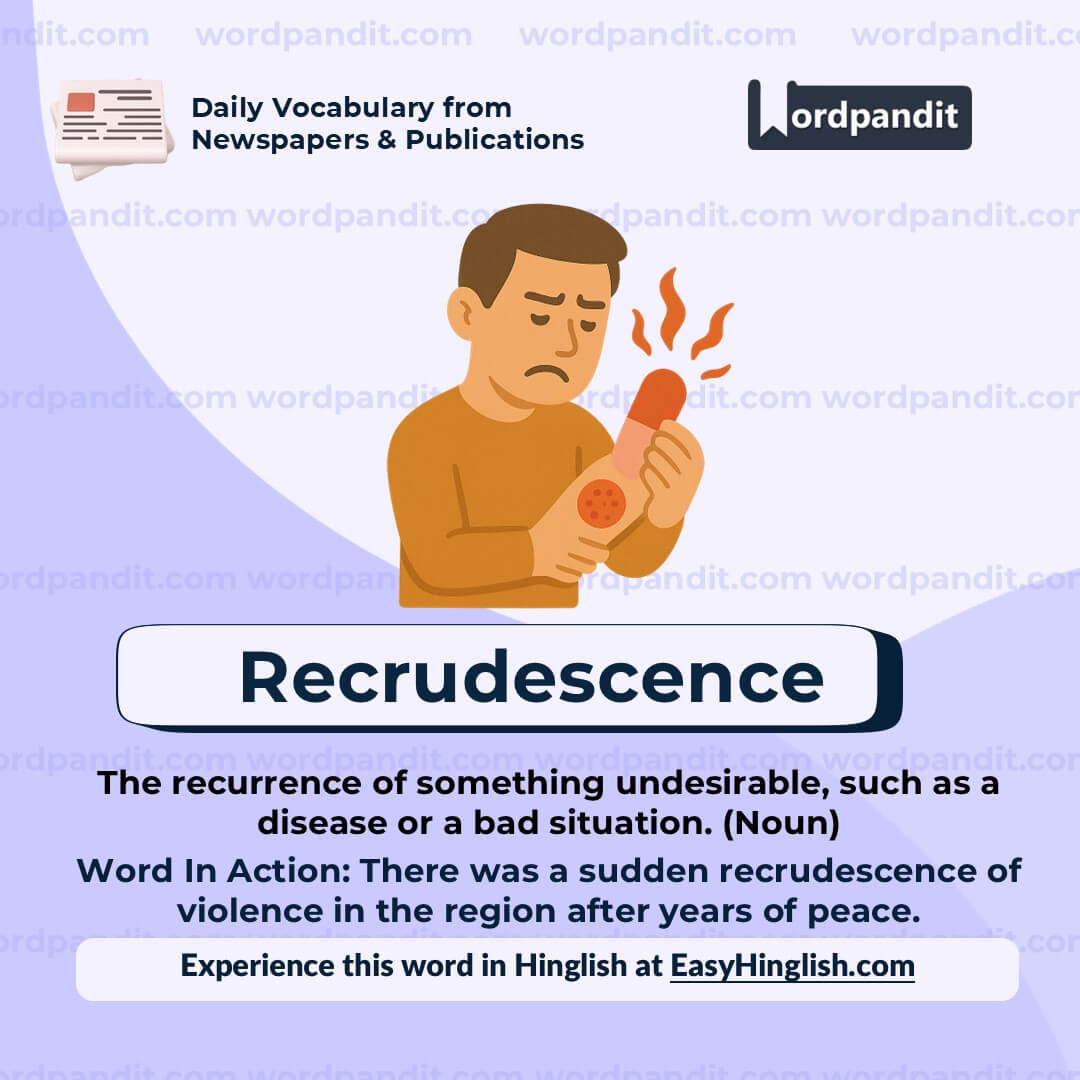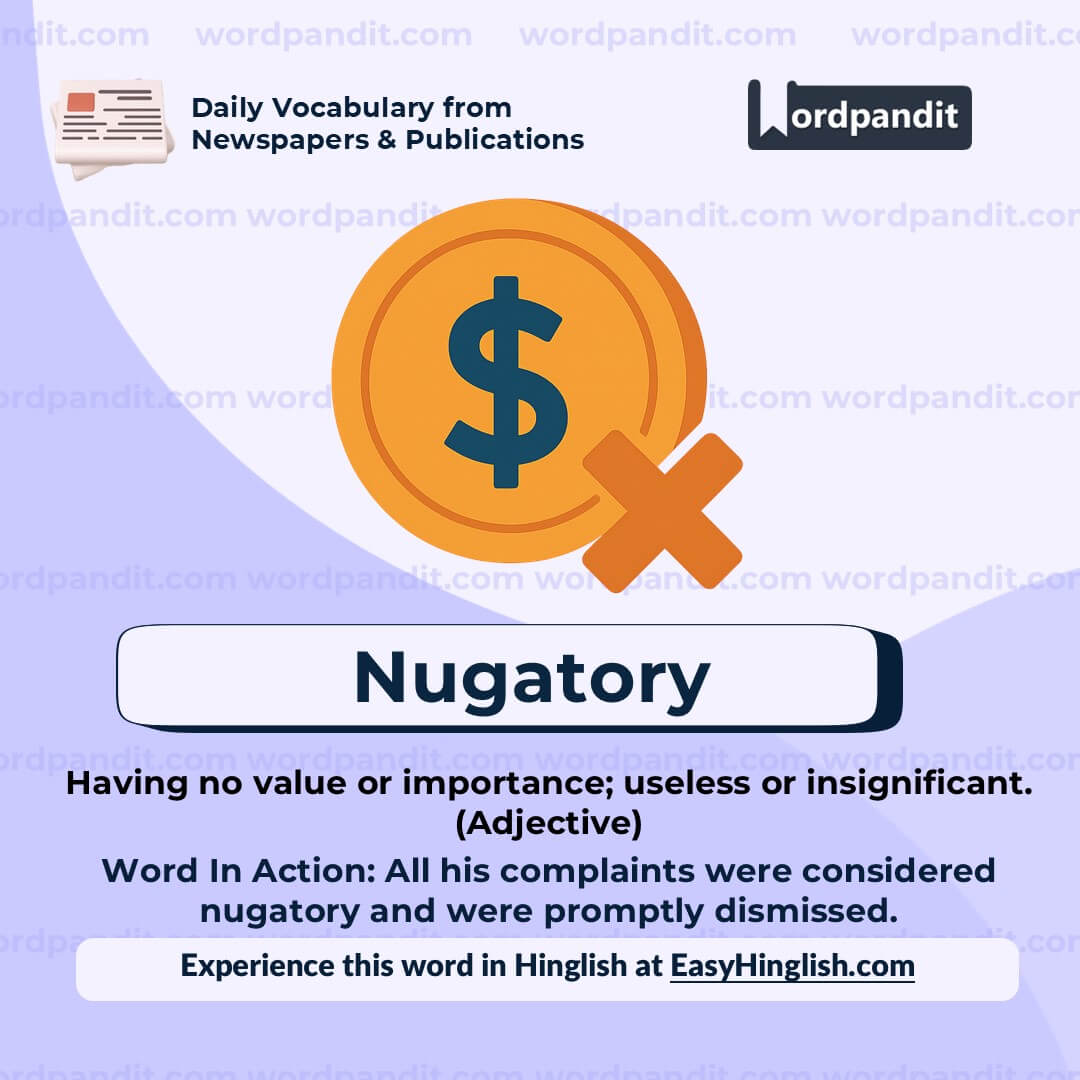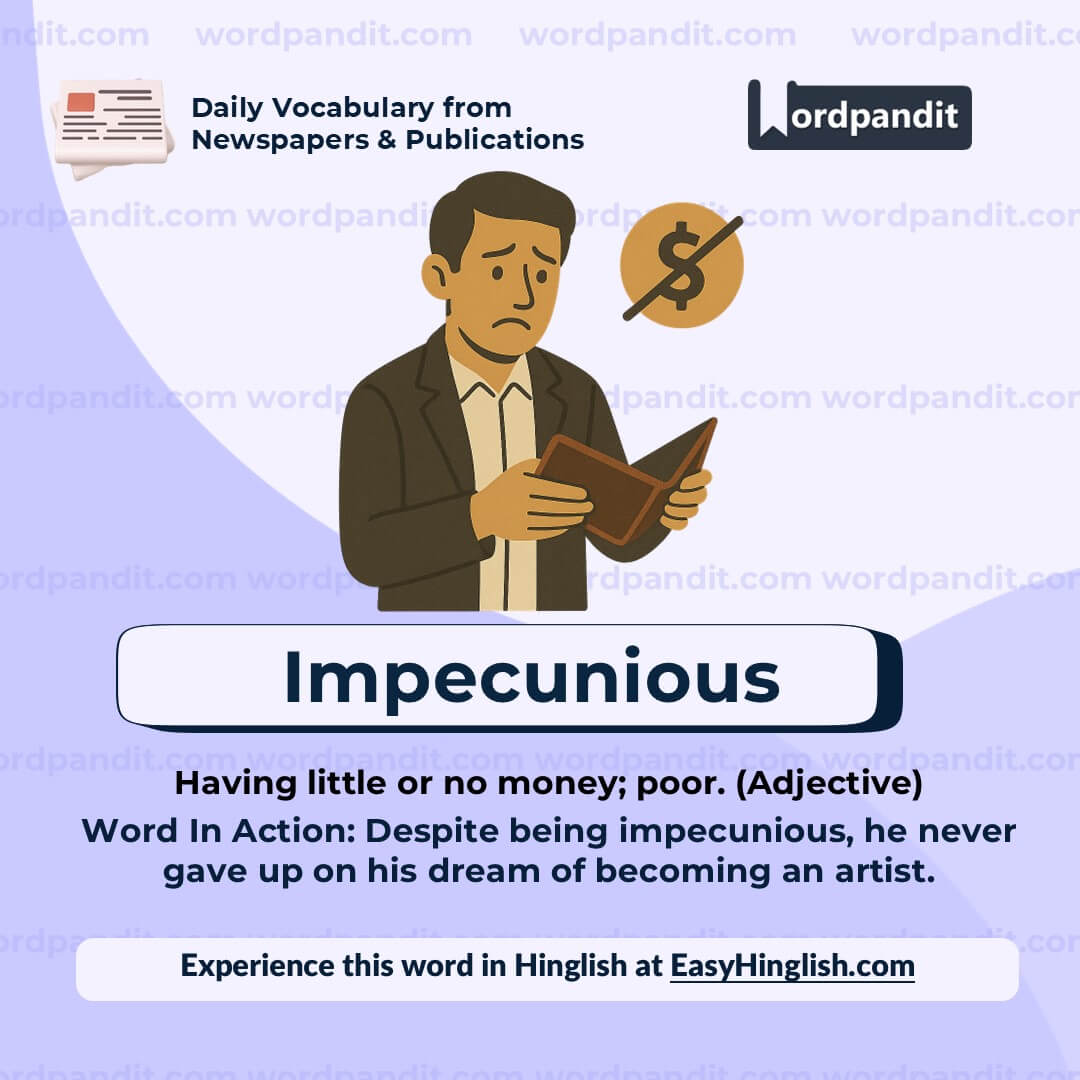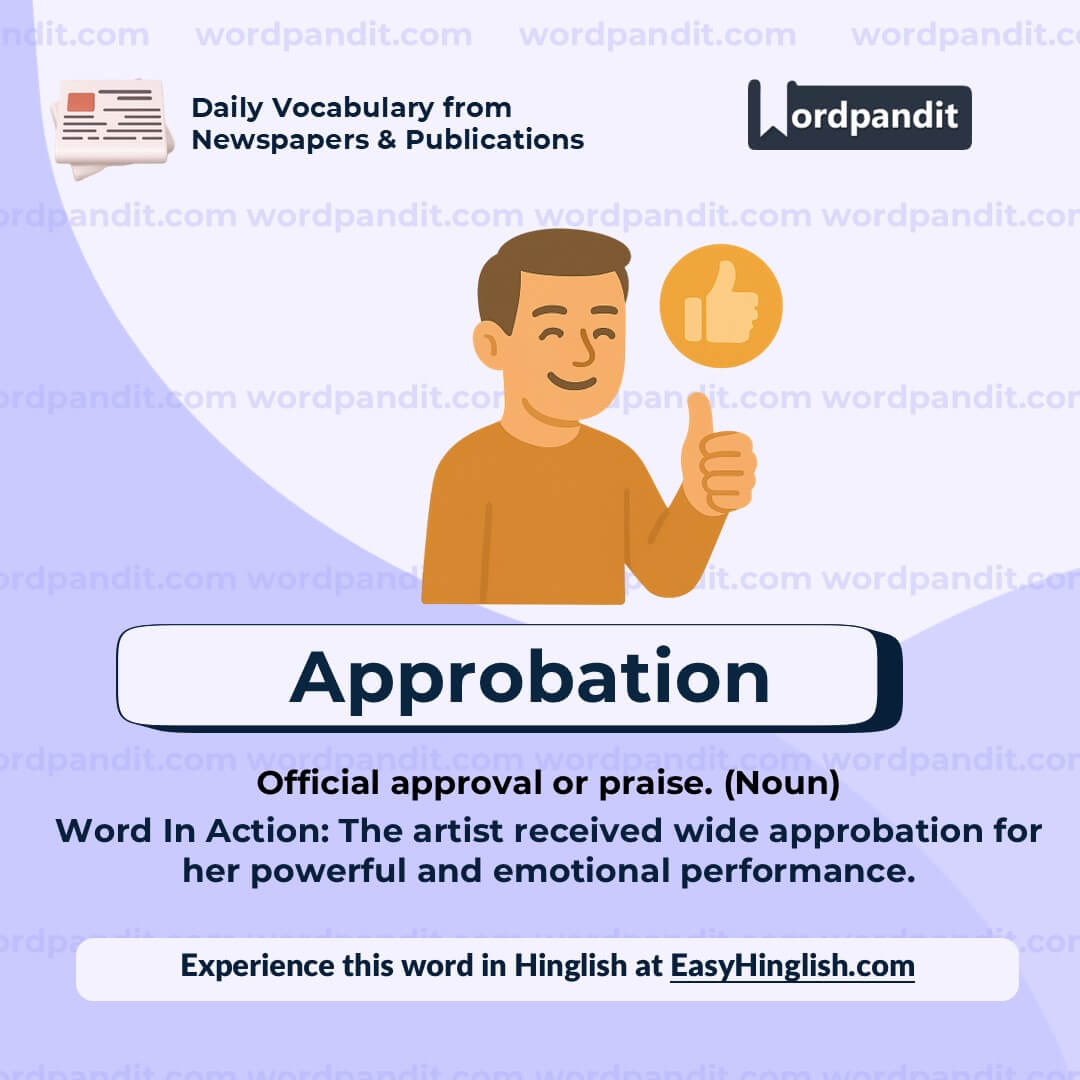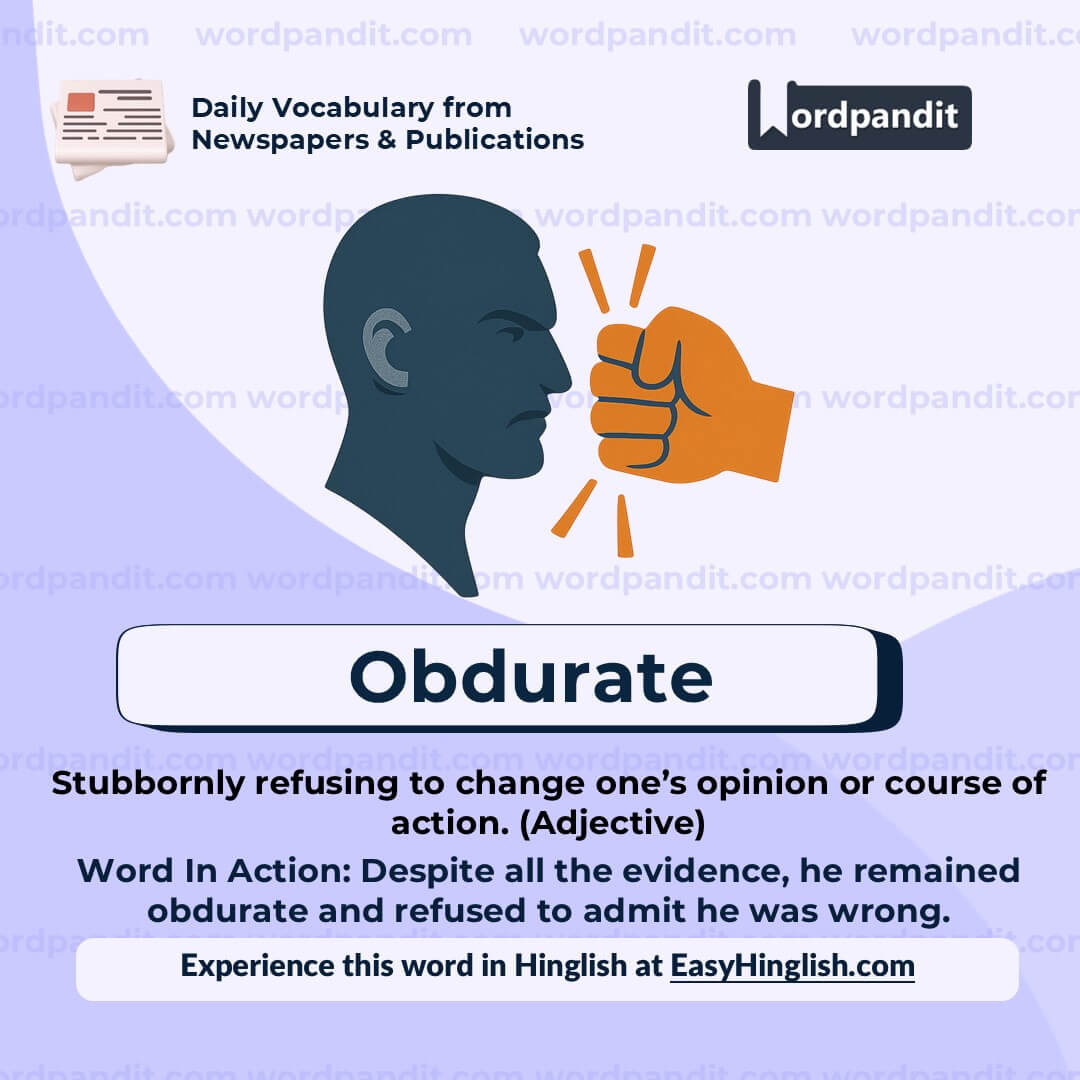Daily Vocabulary from International Newspapers and Publications
Expand Your Vocabulary with Wordpandit’s Global Vocabulary Hub
At Wordpandit, we are committed to helping you develop a truly global vocabulary by drawing from some of the most respected international publications. This section is designed to keep you ahead of the curve by introducing you to words that define global conversations and trends.
The Power of Global Sources
To help you think and communicate on a global scale, we curate vocabulary from renowned international sources, such as:
- The New York Times
- The Washington Post
- BBC
- The Guardian
- The Economist
- Scientific American
- Psychology Today
- And many more...
Stay Global, Stay Competitive
Our daily updates from international publications ensure you are consistently exposed to new words that reflect global news and developments, making sure your vocabulary is not only current but also globally relevant.
Enhance Your Global Perspective
Whether you’re preparing for international exams, aiming to excel in global business communication, or want to enhance your language skills for personal growth, Wordpandit offers the resources you need to thrive in a global context.
Effective Learning, Global Reach
Our learning methodology combines global examples, memory aids, and interactive activities, allowing you to internalize new words effectively and apply them in real-world scenarios.
Begin Your Global Vocabulary Journey Now!
Why Choose Wordpandit?
Practical Learning: Focus on words you'll actually encounter in real-world reading, enhancing your comprehension and communication skills.
Diverse Content: From current affairs to scientific breakthroughs, our varied sources expose you to vocabulary across multiple domains.
Effortless Integration: Make Wordpandit a part of your daily routine. Just a few minutes each day can significantly boost your lexicon over time.
Your Path to Vocabulary Mastery
- Visit our Daily Vocabulary section regularly
- Explore new words and their usage in context
- Practice incorporating these words into your own writing and speech
- Track your progress as your vocabulary expands
Start Your Journey Today
Embark on your vocabulary enhancement journey with Wordpandit. By consistently engaging with our daily posts, you'll build a robust vocabulary that serves you well in academic, professional, and personal contexts.
Remember, a word a day keeps linguistic limitations at bay. Make Wordpandit your daily companion in the quest for vocabulary excellence!
WORD-1: Recrudescence
Context:
"Health officials warn about the recrudescence of diseases previously thought to be under control due to declining vaccination rates." - The Lancet
Explanatory Paragraph:
Recrudescence refers to the return of something undesirable after a period of improvement or inactivity. Often used in medical or social contexts, it describes a situation where an issue that was previously resolved or in decline makes a troubling comeback. In this case, it highlights the resurfacing of diseases due to lowered vaccination efforts.
Meaning: The recurrence of an undesirable condition (Noun)
Pronunciation: ree-kroo-DESS-ents
Difficulty Level: ⭐⭐⭐⭐ Advanced
Etymology: From French "recrudescence", derived from Latin "recrudescere" meaning "to become raw again" (re- ‘again’ + crudescere ‘become raw’).
Prashant Sir's Notes:
Think of "recrudescence" as a comeback — but not the good kind. It's the kind of comeback you'd see in an old conflict reigniting or a disease returning after dormancy. It's an excellent word when talking about cyclical problems.
Synonyms & Antonyms:
Synonyms: resurgence, return, revival, relapse, flare-up
Antonyms: resolution, disappearance, cure, subsidence
Usage Examples:
- The recrudescence of political unrest in the region has alarmed international observers.
- After years of peace, there was a sudden recrudescence of gang violence in the area.
- Scientists are concerned about the recrudescence of antibiotic-resistant bacteria.
- Despite early success, the project failed due to a recrudescence of internal disputes.
Cultural Reference:
"The recrudescence of fascism in parts of Europe is a disturbing trend." – A frequent theme in political commentary during the 2010s resurgence of far-right ideologies.
Think About It:
Can you think of a time when a social issue you believed was resolved made an unexpected comeback? How did society respond to its recrudescence?
Quick Activity:
Write 2 sentences using “recrudescence” — one about a health issue and one about a personal habit that resurfaced.
Memory Tip:
Think: “RE-CRUDE-ESSENCE” – The essence of something crude (bad) is returning again. That’s recrudescence!
Real-World Application:
Recrudescence is commonly used in medicine, international relations, and climate discussions to describe the recurrence of serious issues like diseases, conflicts, or environmental problems.
WORD-2: Nugatory
Context:
"Critics argue that without enforcement mechanisms, the international agreement will prove nugatory in addressing the crisis." - Foreign Policy Journal
Explanatory Paragraph:
Nugatory describes something that is so trivial, ineffective, or unimportant that it has no real value or impact. It often refers to rules, statements, or actions that may exist but serve no meaningful purpose—like a law without any way to enforce it. In the example, the term is used to highlight how an agreement, without enforcement, becomes practically useless.
Meaning: Of no value or importance; ineffective (Adjective)
Pronunciation: NOO-guh-tor-ee
Difficulty Level: ⭐⭐⭐⭐ Advanced
Etymology: From Latin *nugatorius* meaning "worthless," from *nugari* meaning "to trifle or joke."
Prashant Sir's Notes:
This is a great word to express the futility of actions or systems that exist in name only. If something is "nugatory," it’s like a tiger without teeth—present but powerless.
Synonyms & Antonyms:
Synonyms: worthless, trivial, futile, ineffective, insignificant
Antonyms: effective, valuable, meaningful, significant, impactful
Usage Examples:
- All his efforts to change the system were ultimately nugatory due to bureaucratic resistance.
- The contract included clauses that were largely nugatory without proper oversight.
- Her apology seemed nugatory in light of the damage already done.
- They feared the reform would be nugatory unless followed by strict implementation.
Cultural Reference:
"A constitution, in which the great interests of the nation are nugatory, is a mere mockery." — Paraphrased from 19th-century political debates around constitutional effectiveness.
Think About It:
Can you think of a rule or policy in your school, workplace, or society that seems nugatory? Why do you think it has lost its impact?
Quick Activity:
Write a sentence using “nugatory” to describe a situation where someone's opinion or action had no real consequence.
Memory Tip:
Think: "Nugatory = No Use At all + Story" → A story that serves no use is nugatory!
Real-World Application:
The word is especially relevant in discussions about ineffective laws, symbolic gestures in politics, or empty corporate policies that don’t lead to change.
WORD-3: Impecunious
Context:
"Despite being impecunious for most of his early career, the artist refused to compromise his distinctive style for commercial success." - ARTnews
Explanatory Paragraph:
Impecunious describes someone who has little or no money—basically, someone who’s broke. It’s often used to portray struggling artists, students, or dreamers who lack wealth but may be rich in ideals or creativity. The word carries a formal or literary tone, often used with a touch of sympathy or admiration.
Meaning: Having little or no money; poor (Adjective)
Pronunciation: im-peh-KYOO-nee-us
Difficulty Level: ⭐⭐⭐ Intermediate
Etymology: From Latin *impecuniosus*, from *im-* (not) + *pecunia* (money), which itself comes from *pecu* meaning cattle, a measure of wealth in ancient times.
Prashant Sir's Notes:
Impecunious is one of those elegant ways to say someone is broke. Use it instead of "poor" in academic or literary writing to add a touch of sophistication. Also, it’s great to describe people who pursue passion over profit.
Synonyms & Antonyms:
Synonyms: penniless, destitute, indigent, needy, broke
Antonyms: wealthy, affluent, prosperous, well-off, rich
Usage Examples:
- He remained impecunious even after publishing several critically acclaimed novels.
- During her impecunious student years, she relied heavily on scholarships and part-time jobs.
- Many brilliant scientists began their journeys as impecunious researchers chasing pure knowledge.
- The movie portrays the life of an impecunious musician who plays in subway stations for coins.
Cultural Reference:
"The impecunious bohemian artist" is a recurring character in literature and film, symbolizing the noble struggle for art over commercialism — seen in classics like *Moulin Rouge* and *La Bohème*.
Think About It:
Why do you think society often romanticizes the life of the impecunious artist or creator? What does this say about our values?
Quick Activity:
Write a short paragraph describing a character who is impecunious but proud. Use the word naturally in the paragraph.
Memory Tip:
Break it down: "Im" (not) + "pecuniary" (money-related) = not having money = impecunious!
Real-World Application:
This word is especially useful in literary writing, biographies, or when describing early struggles of successful individuals. It adds a polished, formal tone to the idea of financial hardship.
WORD-4: Approbation
Context:
"The groundbreaking research has received worldwide approbation for its potential to transform treatment options for this previously intractable condition." - Nature
Explanatory Paragraph:
Approbation is a formal word meaning approval or praise, especially from a respected authority or the public. When someone receives approbation, it signifies not just recognition but also validation of their work or actions. In the example, the research has earned global recognition and endorsement, emphasizing its importance in the medical world.
Meaning: Official approval or praise (Noun)
Pronunciation: ap-ruh-BAY-shun
Difficulty Level: ⭐⭐⭐ Intermediate
Etymology: From Latin *approbatio*, meaning “approval” or “assent,” from *approbare* — to approve.
Prashant Sir's Notes:
Use “approbation” when you want to highlight a strong, often formal or institutional form of approval—like a panel’s praise for a paper, or public applause for a humanitarian. It’s a classier alternative to “praise” or “approval.”
Synonyms & Antonyms:
Synonyms: approval, praise, endorsement, commendation, acclaim
Antonyms: disapproval, criticism, condemnation, censure
Usage Examples:
- The scientist’s revolutionary theory was met with widespread approbation from the academic community.
- Her proposal received approbation from the board, securing the funding needed for implementation.
- The artist basked in the approbation that followed his first international exhibit.
- Winning the literary award was a moment of public approbation he had long dreamed of.
Cultural Reference:
In ancient Rome, public approbation was a significant part of political life. Triumphs, speeches, and monuments were used to symbolize the people’s and Senate’s approval of military leaders and statesmen.
Think About It:
Is seeking approbation necessary for progress, or can it sometimes hinder creativity and authenticity? Where do you draw the line between validation and dependence?
Quick Activity:
Write two sentences: one using “approbation” in a professional context, and one in a personal or creative context (like receiving praise for art or writing).
Memory Tip:
Think: “Applause + Probation” → If you’re on probation and you get applause, you’ve earned approbation (approval)!
Real-World Application:
Approbation is commonly used in academic, corporate, and political settings to describe formal recognition or endorsement, such as peer-reviewed praise, policy approval, or awards.
WORD-5: Obdurate
Context:
"The regime remains obdurate in its refusal to allow international observers access to detention facilities despite mounting pressure." - Human Rights Watch
Explanatory Paragraph:
Obdurate describes someone who is stubbornly refusing to change their opinion or course of action, even in the face of reason or compassion. It suggests a hard-heartedness or an unyielding attitude, especially when flexibility or empathy would be appropriate. In this context, the regime is portrayed as rigid and uncooperative, even under growing external pressure.
Meaning: Stubbornly refusing to change one’s opinion or actions; unyielding (Adjective)
Pronunciation: OB-dyuh-rit
Difficulty Level: ⭐⭐⭐ Intermediate
Etymology: From Latin *obduratus*, past participle of *obdurare* meaning “to harden,” from *ob-* (against) + *durare* (to harden, endure).
Prashant Sir's Notes:
Think of “obdurate” as a formal, weighty way to say “stubborn”—but with an edge. It often carries a moral or emotional judgment, implying coldness or a refusal to be moved by logic or empathy.
Synonyms & Antonyms:
Synonyms: stubborn, unyielding, inflexible, unrelenting, adamant
Antonyms: yielding, compassionate, flexible, amenable, lenient
Usage Examples:
- The obdurate CEO refused to negotiate with the striking workers.
- Her obdurate stance on the issue alienated even her closest allies.
- The child remained obdurate, unwilling to apologize despite clear evidence of wrongdoing.
- His obdurate heart showed no sign of regret for the pain he had caused.
Cultural Reference:
In Charles Dickens’ *Oliver Twist*, characters like Mr. Bumble embody obdurate authority figures—unyielding, cruel, and resistant to reform, symbolizing the harshness of Victorian institutions.
Think About It:
When does firmness become obduracy? Is it always wrong to be unyielding, or can it sometimes be a virtue?
Quick Activity:
Think of a historical figure known for their unbending stance. Write 1–2 sentences describing them using the word “obdurate.”
Memory Tip:
Obdurate sounds like “obstacle + durable” — someone who is a durable obstacle to change is obdurate!
Real-World Application:
Obdurate is commonly used in discussions of politics, negotiations, and personal relationships where someone’s inflexible stance becomes a roadblock to progress or understanding.



